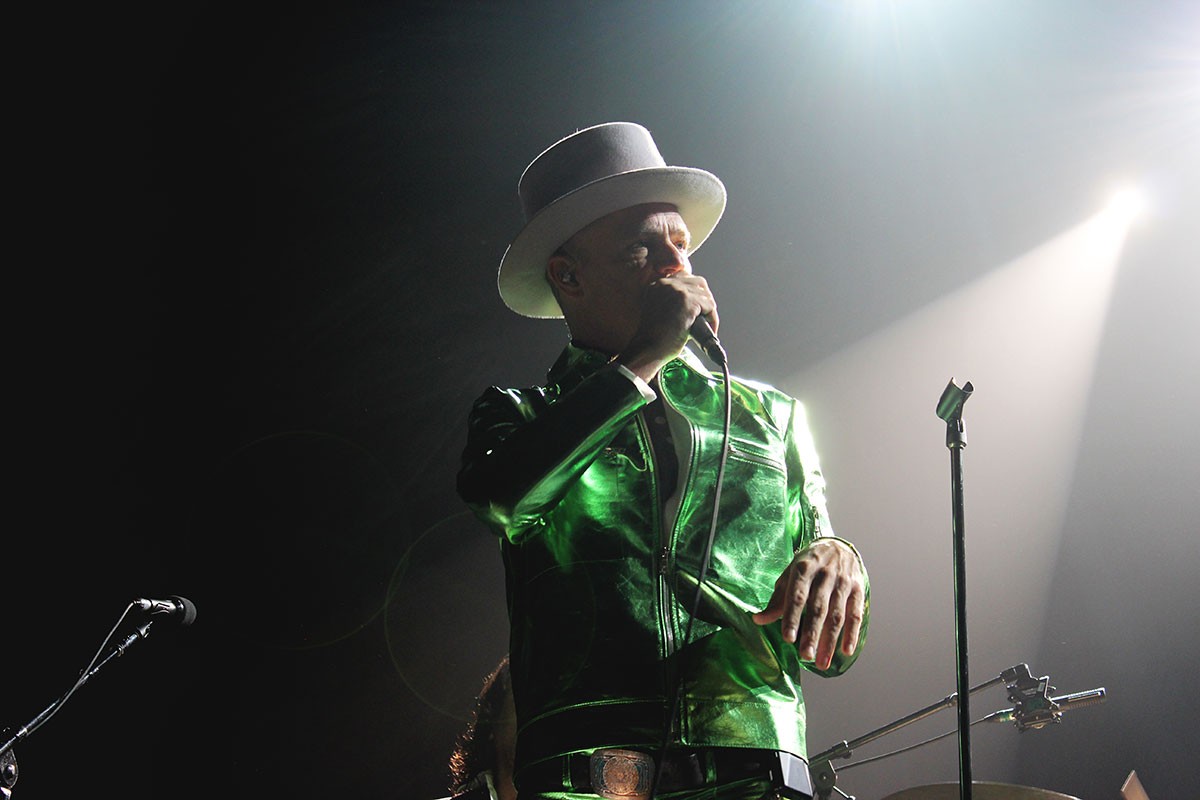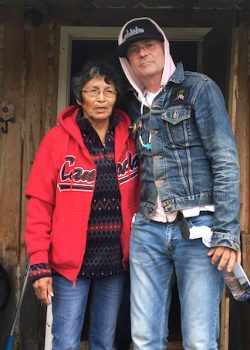
Gord Downie on stage with the Tragically Hip on Aug. 5, 2016 at the MTS Centre in Winnipeg. // Photo by Chris Reid.
Gord Downie’s legacy lives on at U of M
Gord Downie, Tragically Hip front man, has died but his legacy of creating a better path forward for Canada lives on through the work of the National Centre for Truth and Reconciliation at the University of Manitoba.
“Our nation has lost a great artist and an exemplary citizen,” says David Barnard, President at the University of Manitoba. “Because of Gord Downie, we have that brilliant music and poetry, which provide us with an exhilarating reflection of our collective memories and dreams, and we also have a broadened conversation about who we are and who we want to be as Canadians. He showed immeasurable courage in his last days, taking the spotlight off himself and turning it onto this nation’s unjust treatment of Indigenous peoples. It was a privilege to be able to partner with him, and we will remain focused on our shared goals through the work we do at the National Centre for Truth and Reconciliation, as well as throughout our institution.”
Downie and the National Centre for Truth and Reconciliation at the University of Manitoba entered a unique relationship in September 2016 when Downie released his multimedia project Secret Path. Proceeds from the Juno-winning project have supported the work of the NCTR, something close to Downie’s heart.
“I am trying in this small way to help spread what Murray Sinclair said, ‘This is not an Aboriginal problem. This is a Canadian problem,” Mr. Downie wrote in a statement at the time.

EVELYN BAXTER, CHANIE WENJACK’S SISTER, WITH GORD DOWNIE OUTSIDE HER HOME IN OGOKI POST, ONT. // PHOTO: GRAND CHIEF ALVIN FIDDLER
Around this time, Ry Moran, director of the NCTR, met Downie at Ogoki Post, Ont., a small fly-in community located in northwestern Ontario. They were visiting Chanie Wenjack’s family, the boy whose story is told in Secret Path.
Gathered in the home of Wenjack’s sister, Pearl, Downie played the first track off the album. It was a powerful moment, Moran recalled in a Globe and Mail editorial.
“Gord is an icon for me; someone I grew up not just listening too, but living life to. Gord’s music is as much fused into my world as is air or water; it’s what I drank in to keep going, what I breathed when I needed it. But I’m not alone in this experience. Gord is fused into the fabric of Canada. His music is as Canadian as anything I can think of,” Ry wrote.
“It is exceptionally powerful to see one of Canada’s most well-known and well-loved performers lend his voice to the struggle for truth and reconciliation. For far too long in this country, the stories of the children that never returned home from the residential schools have been ignored or silenced by mainstream Canada.”
Downie’s vision, that Canadians learn the story of Chanie Wenjack and the thousands like him, lives on in the work of NCTR, just one more legacy the beloved Canadian icon leaves behind.
The Gord Downie Secret Path Fund for Truth and Reconciliation was created to support the NCTR’s initiatives related to missing children and unmarked burials.
Statement from Survivors and Governing Circle, The National Centre for Truth and Reconciliation
“We are deeply saddened to hear of the passing of Gord Downie. Today we lost a friend, an ally and a person we deeply admire and respect.
Gord was instrumental in raising awareness of the history of Residential Schools and the untimely death of so many children in those schools. He called for change and the country heard him.
His contributions to The National Centre for Truth and Reconciliation and the broader efforts of Truth and Reconciliation, are profound, immense, and serve as an ongoing call to action for other Canadians to recognize we can and must do better as a country.
Gord spoke at length about the fact that we are not a real country—that until we get the relationship right with Indigenous peoples we are playing make believe as a nation. He highlighted that we continue to live in a society that is unfair and unjust on the most fundamental of terms. He spoke of our collective opportunity to get the relationship right between indigenous peoples and this nation and that it will take all of us working together to realize this vision.
Through his work, Canadians are presented with a role model—a powerful example of how one person can make a difference. He demonstrated that the most important element in this work of national healing is that we each have the ability to make a difference – in our own way, to our own ability and with our own individual talents and gifts.
We hope Gord found peace in knowing his efforts will serve as a beacon of light now and long into the future. We wish his spirit well as it travels forward and we will continue to honour him in our work moving forward.
Our thoughts and love are with the family during this difficult time. He will always be loved.”
- Ry Moran, on behalf of Survivors and Governing Circle, The National Centre for Truth and Reconciliation.






